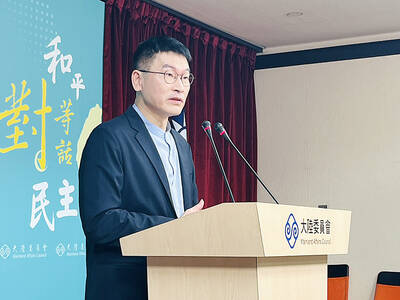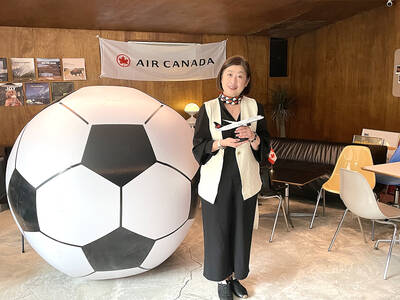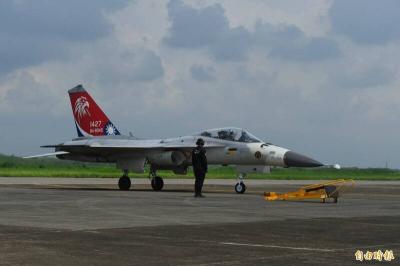China warned the US and other governments yesterday against using missile-defense systems to protect Taiwan or helping Taipei produce its own system.
"China opposes any country's inclusion of Taiwan in its missile defense system," said Zhang Yan (張炎), director-general of the Chinese Foreign Ministry's arms control department.
"It also opposes efforts or attempts to support or provide the Taiwan region with a missile defense system," he said.
Zhang didn't mention the US by name, but some US officials have suggested that a possible missile defense system might be extended to Taiwan.
Asked whether China would use nuclear weapons to threaten or attack Taiwan, Zhang repeated China's pledge not to be the first to use nuclear weapons in a conflict and not to use them against "non-nuclear-weapons states."
"That position has remained unchanged and will not change in the future," Zhang said.
`We will seek peaceful reunification with maximum efforts and sincerity, but we will never tolerate Taiwan independence,'' Foreign Ministry spokesman Qin Gang (
Both men's comments came after Beijing issued a white paper, China's Endeavors for Arms Control, Disarmament and Non-Proliferation, ahead of President Hu Jintao's (胡錦濤) visit to the US next week.
"China does not wish to see a missile defense system produce negative impact on global strategic stability, bring new unstable factors to international and regional peace and stability, erode trust among big powers or undermine legitimate security interests of other countries," the report said.
In the 17,000-word paper, China also reiterated its commitment to a policy of no-first-use of nuclear weapons and pledged not to engage in a nuclear arms race.
In Taipei, Mainland Affairs Council Vice Chairman You Ying-lung (
Additional reporting by Shih Hsiu-chuan

LOW RISK: Most nations do not extradite people accused of political crimes, and the UN says extradition can only happen if the act is a crime in both countries, an official said China yesterday issued wanted notices for two Taiwanese influencers, accusing them of committing “separatist acts” by criticizing Beijing, amid broadening concerns over China’s state-directed transnational repression. The Quanzhou Public Security Bureau in a notice posted online said police are offering a reward of up to 25,000 yuan (US$3,523) for information that could contribute to the investigation or apprehension of pro-Taiwanese independence YouTuber Wen Tzu-yu (溫子渝),who is known as Pa Chiung (八炯) online, and rapper Chen Po-yuan (陳柏源). Wen and Chen are suspected of spreading content that supported secession from China, slandered Chinese policies that benefit Taiwanese and discrimination against Chinese spouses of

ALIGNED THINKING: Taiwan and Japan have a mutual interest in trade, culture and engineering, and can work together for stability, Cho Jung-tai said Taiwan and Japan are two like-minded countries willing to work together to form a “safety barrier” in the Indo-Pacific region, Premier Cho Jung-tai (卓榮泰) yesterday said at the opening ceremony of the 35th Taiwan-Japan Modern Engineering and Technology Symposium in Taipei. Taiwan and Japan are close geographically and closer emotionally, he added. Citing the overflowing of a barrier lake in the Mataian River (馬太鞍溪) in September, Cho said the submersible water level sensors given by Japan during the disaster helped Taiwan monitor the lake’s water levels more accurately. Japan also provided a lot of vaccines early in the outbreak of the COVID-19 pandemic,

PROMOTION: Travelers who want a free stopover must book their flights with designated travel agents, such as Lion Travel, Holiday Tours, Cola Tour and Life Tours Air Canada yesterday said it is offering Taiwanese travelers who are headed to North America free stopovers if they transit though airports in Japan and South Korea. The promotion was launched in response to a potential rise in demand for flights to North America in June and July next year, when the US, Canada and Mexico are scheduled to jointly host the FIFA World Cup, Air Canada said. Air Canada offers services to 13 of the 16 host cities of the tournament’s soccer games, including Toronto and Vancouver; Mexico City, Guadalajara and Monterrey in Mexico; Atlanta, Georgia; Boston; Dallas; Houston;

The US approved the possible sale to Taiwan of fighter jet spare and repair parts for US$330 million, the Pentagon said late yesterday, marking the first such potential transaction since US President Donald Trump took office in January. "The proposed sale will improve the recipient's capability to meet current and future threats by maintaining the operational readiness of the recipient's fleet of F-16, C-130," and other aircraft, the Pentagon said in a statement. Trump previously said that Chinese President Xi Jinping (習近平) has told him he would not invade Taiwan while the Republican leader is in office. The announcement of the possible arms